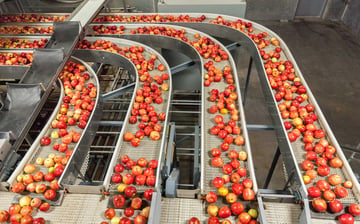"When you consider that 3,000 people die every year from foodborne illness—that's one 9/11 every year," says FoodLogiQ CEO Sean O'Leary. "That's unacceptable because this is a preventable issue, and unfortunately, these illnesses are an underreported public health problem."
FoodLogiQ shared thoughts from corporate leadership today in the wake of the ongoing E. coli outbreak linked to romaine lettuce. The affected produce has sickened 67 people in 19 states, with 39 hospitalizations and six cases of kidney failure, according to a November 26, 2019 update from the U.S. Centers for Disease Control and Prevention (CDC). As of today, no deaths have been attributed to the E. coli outbreak.
Currently, the CDC still has not identified the contamination source or where all of the suspect lettuce was grown, although Salinas, California, is believed to be a potential source site. The Food and Drug Administration (FDA) has also stated it is not certain where in the supply chain the contamination occurred, as no common grower, supplier, distributor or brand of romaine lettuce has been identified. The organization has deployed investigators to the farms in question to try to determine the source and the extent of the contamination.
In the meantime, consumers were advised this week to beware of purchasing or eating romaine lettuce harvested from the Salinas, California growing region. This includes whole heads and hearts of romaine, chopped romaine, organic romaine, or salads and salad mixes containing romaine. If consumers do not know where the lettuce was grown, they should throw it away or return it to the place of purchase. Also, if romaine lettuce does not have information about the harvest region or does not indicate that it has been grown indoors (i.e., hydroponically and greenhouse-grown), consumers should throw it away or return it to the place of purchase. Consumers ordering salad containing romaine at a restaurant or at a salad bar should ask the staff whether the romaine came from Salinas. If it did, or they do not know, they should not eat it.
While anyone can develop E. coli infection from exposure to the pathogen, there are certain population demographics - pregnant women, people with weakened immune systems, young children and elderly adults - who are most susceptible to developing severe complications, such as kidney failure and even death, if they become ill.
FoodLogiQ Insight
Unfortunately, recalls and withdrawals are a fact of life in the food industry, and they can happen for a variety of reasons. Whether it’s a quality or packaging problem or a food-safety issue, if you’re a part of the food supply chain, it’s not a matter of if your company will be affected by a recall; it’s simply a matter of when.
CDC statistics tell us that approximately 48 million people get sick every year from foodborne illnesses—and that’s just in the United States; 128,000 of them end up in the hospital. When you consider that 3,000 people die every year from foodborne illness—that’s one 9/11 every year. According to FoodLogiQ CEO Sean O’Leary, that’s unacceptable because this is a preventable issue, and unfortunately, these illnesses are an underreported public health problem.
“My challenge to the food industry is simple,” says O’Leary. “What if we made just a 1% improvement in the number of cases of foodborne illness? That seems like such a small percentage, but when you do that math, that’s 480,000 people who don’t get sick this year; 1,280 people who aren’t admitted to the hospital; and 30 people who don’t die. Those are significant numbers.”
FoodLogiQ’s Solution: The Connect Platform
By having a robust end-to-end traceability program and technology that provides real-time data and visibility, companies facing a recall can isolate and surgically withdraw the tainted product out of the supply chain without recalling unnecessary items. First and foremost, that process protects consumers; it also limits the disruption and waste of good food, which saves the company money.
To address these and other food safety issues, FoodLogiQ created a software solution that allows food companies to efficiently manage their suppliers, capture all the data needed for a transparent and FSMA-compliant supply chain, and stitch together Critical Tracking Events (CTEs) to achieve real farm-to-fork traceability.
According to Lucelena Angarita, Director of Supply Chain Traceability for Independent Purchasing Cooperative, Inc., the purchasing cooperative for Subway® franchisees, FoodLogiQ’s Connect platform provides IPC with useful shipment information that, in the event of a quality issue, supplies the data to make real-time business decisions that protect the consumer and the Subway® brand. This is only possible if all supply chain partners collaborate to report the CTEs in their traceability system.
“We know that being proactive and prepared can make all the difference in successfully managing a quality incident,” says Angarita. “That’s why we partnered with FoodLogiQ in 2015, launching the Subway®-IPC/FoodLogiQ Traceability Program. Using FoodLogiQ Connect’s Track + Trace together with GS1 US Foodservice Standards, our supply chain partners can manage and track their shipments from the manufacturing plants all the way to the restaurant. That supply chain visibility mitigates risk, which is extremely valuable when consumer safety is at stake.”
"Currently, 99% of the produce sold by volume to Subway® has a GS1-128 barcode, which is the industry-recognized standard for traceability by product and location, and the foundation of FoodLogiQ’s platform. Now, our distributor partners are starting to scan the barcodes as they deliver each case to our restaurants, helping us reach our full supply chain traceability goals,” says Angarita.
“We’re proud to work with organizations like IPC/Subway® who are committed to consumer transparency and want to provide their customers with safe, high-quality food,” says O’Leary. “In this complex global supply chain, that’s what they demand and deserve.
Schedule a demo with one of our experts to learn how your business can take steps to protect consumers and your company brand through improved traceability with cloud-based traceability software.
Other posts you might be interested in
View All Posts
Supplier Compliance
8 min read
| May 31, 2018
In Wake of Romaine Lettuce Recall, FoodLogiQ Shares Thoughts on the Importance of Supply Chain Management and Food Traceability
Read More.jpg?length=360&name=State%20of%20Food%20Traceability_Blog%20(1).jpg)
Supplier Compliance
4 min read
| October 16, 2019
Food Traceability: a Movement with Momentum
Read More
Trustwell News
6 min read
| December 17, 2021

